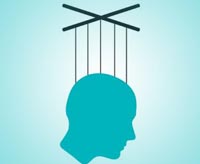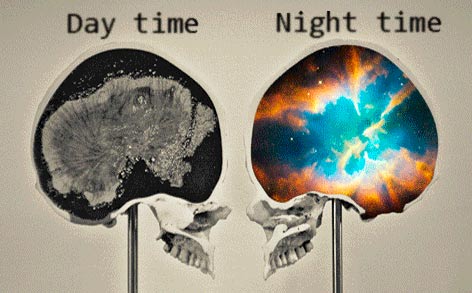Life
12 Interesting Facts About The Power of Your Dreams
Dreams are fascinating and curious and everyone has them; if you can remember each and every one of them though is another question. It is interesting to look at what happens when you dream, why some people seem to remember their dreams more than others, and if dreams really have any true significance.
Below are 12 facts about the power of your dreams, ranging from the complex to the absurd; so if you are fascinated by dreams, read on:
Why & How You Dream
What Happens When You Dream?
 Dreaming can be divided into stages, the first being when the central nervous system begins to fire up. Dreaming occurs in the deepest part of your sleep when your brain is only experiencing delta waves. After around ninety minutes of rapid eye movement sleep, your heart rate and breathing quicken as the nervous systems fires up and your brain starts to receive signals to the thalamus. This information that comes from the base of the brain is a dream.
Dreaming can be divided into stages, the first being when the central nervous system begins to fire up. Dreaming occurs in the deepest part of your sleep when your brain is only experiencing delta waves. After around ninety minutes of rapid eye movement sleep, your heart rate and breathing quicken as the nervous systems fires up and your brain starts to receive signals to the thalamus. This information that comes from the base of the brain is a dream.
Once dreaming commences, Cortisol is produced in large quantities, Cortisol being the chemical responsible for memory consolidation. Both men and women will become sexually aroused throughout dreaming, but you will never normally leave your bed. Whilst dreaming the brain also releases glycine which paralyses your muscles and stops you from taking a walk anywhere and stops you from harming yourself or running into danger.
The Human mind is able to control dreams
 There are certain phases within normal dreaming and during “lucid dreaming” it is actually possible to control what will happen in your dream, the outcome, and even change the course of the dream if you are unhappy with the pending outcome.
There are certain phases within normal dreaming and during “lucid dreaming” it is actually possible to control what will happen in your dream, the outcome, and even change the course of the dream if you are unhappy with the pending outcome.
Manipulating dreams can be fun, and most especially on the occasions where you are fortunate enough to remember a dream, you can wake feeling elated in the knowledge that you controlled your own destiny. What you dream about is often something that you have witnessed in the past, and under these circumstances the human mind is able to “change the course of history” whilst asleep.
You can wake to act out what you were dreaming about
 Dreams can cause incorporation. What this means in simple terms is that you may often wake to indulge in an activity that you were dreaming about. If you are constantly thirsty in your dream you can wake to go and drink water, and if you were hungry in your dream chances are you will head to the fridge when you wake up.
Dreams can cause incorporation. What this means in simple terms is that you may often wake to indulge in an activity that you were dreaming about. If you are constantly thirsty in your dream you can wake to go and drink water, and if you were hungry in your dream chances are you will head to the fridge when you wake up.
A need to use the bathroom can also occur during dreams and once again chances are you will wake with the urge to urinate.
The language used in dreams is indirect
 One reason that it is often difficult to interpret or even understand a dream lies with the fact that dreams do not use the same language as when one is awake. The language used in dreams is very indirect and symbols are often used that can be interpreted, but only by the subconscious mind. For this reason many books have been written on the interpretation of dreams, people becoming deeply fascinating by their dreams and needing to comprehend them.
One reason that it is often difficult to interpret or even understand a dream lies with the fact that dreams do not use the same language as when one is awake. The language used in dreams is very indirect and symbols are often used that can be interpreted, but only by the subconscious mind. For this reason many books have been written on the interpretation of dreams, people becoming deeply fascinating by their dreams and needing to comprehend them.
If you remember a dream it will often be made of scenes or pieces of information that are familiar to you, but jumbled into an order that makes little or no sense; the more you try to understand what you have dreamed, the more intriguing it all becomes.
In general dreams are not remembered
 You may believe that some people remember dreams more than others and this in part may be true. However, it is normally hard to remember a whole dream and quite hard to remember one or more sequences that make up a dream. It is believed that you will only remember what you were dreaming about if you are woken up during REM sleep. This can explain why people will say that they regret their alarm sounding as it interrupted a great dream, but the truth is that if they had been left to wake up naturally they would not have remembered it.
You may believe that some people remember dreams more than others and this in part may be true. However, it is normally hard to remember a whole dream and quite hard to remember one or more sequences that make up a dream. It is believed that you will only remember what you were dreaming about if you are woken up during REM sleep. This can explain why people will say that they regret their alarm sounding as it interrupted a great dream, but the truth is that if they had been left to wake up naturally they would not have remembered it.
You often dream of forbidden pleasures
 If you are on a diet and watching your weight, you may dream about gorging on chocolate. If you have your eye secretly on a work colleague, but you are married, you may well dream of a time you were together. After this kind of dream the person often experiences guilt or embarrassment, especially if they dreamed they slept with their boss! In fact, psychological disorders can even have an effect on the way one dreams.
If you are on a diet and watching your weight, you may dream about gorging on chocolate. If you have your eye secretly on a work colleague, but you are married, you may well dream of a time you were together. After this kind of dream the person often experiences guilt or embarrassment, especially if they dreamed they slept with their boss! In fact, psychological disorders can even have an effect on the way one dreams.
So, if you dreamed of a forbidden pleasure, don’t feel guilty about it, rest assured that you were not the only one!
Not all people are able to dream in colour
 Not all people will dream in colour. Only being able to dream in black and white is common with around a third of people reporting this finding. The reason behind this is still being researched, as it the reason that only some people will have repetitive dreams.
Not all people will dream in colour. Only being able to dream in black and white is common with around a third of people reporting this finding. The reason behind this is still being researched, as it the reason that only some people will have repetitive dreams.
Repetitive dreams are most frequently bad dreams and these may range from dreaming you have failed your driving test, to dreaming that someone dear to you is dead when they are alive. The relevance of colour in dreaming as well as repetitive dreams is still being researched, one dream that many people experience frequently being running away from something or someone.
Dreaming keeps you healthy
 Being woken up regularly during REM sleep is said to have a profound negative effect on mental and physical health.
Being woken up regularly during REM sleep is said to have a profound negative effect on mental and physical health.
Studies have shown that people who never manage to experience real dreaming as they are constantly being woken up are far more likely to suffer from psychotic episodes and even hallucinations.
When you are deep in a dream, your body is releasing stress and helping you come to terms with some of the built up emotional troubles during your past week, this is a great way for your body to relieve itself of stress for clear thinking and better judgement.
Blind people dream too
 Research has come up with some very interesting findings that concern dreaming and those who are visually impaired. All visually impaired people were noted to dream, but those who were born with no vision only dreamed in senses of touch, noise, and smell.
Research has come up with some very interesting findings that concern dreaming and those who are visually impaired. All visually impaired people were noted to dream, but those who were born with no vision only dreamed in senses of touch, noise, and smell.
People who had lost their eyesight after birth were however reported to still be able to dream visually.
Your pets dream too
 Sleep patterns in animals, most especially mammals has been monitored and the finding are very interesting indeed. Animals experience the same different stages of sleep as humans, and although it is not possible to ask a pet about their dream, it is possible to watch a pet while he is dreaming.
Sleep patterns in animals, most especially mammals has been monitored and the finding are very interesting indeed. Animals experience the same different stages of sleep as humans, and although it is not possible to ask a pet about their dream, it is possible to watch a pet while he is dreaming.
In fact, if your dog wakes up after hearing a noise such as the phone or door bell and appears startled or behaves strangely, chances are that you have disturbed their dream.
Some great inventions were first thought of whilst dreaming
 The human being does not start dreaming until around the age of three years old, but after this age the mind can become very inventive when asleep.
The human being does not start dreaming until around the age of three years old, but after this age the mind can become very inventive when asleep.
Alexander Graham Bell dreamed of the phone before he went on to invent it, and many people frequently jot down interesting thoughts when they wake from dreaming.
Paul McCartney from “The Beatles” also states that he discovered the tune for “Yesterday” while he was dreaming. The King of horror, Stephen King admits to a number of successful story ideas coming to him while he dreamed.
Have you come with any amazing ideas through a dream that proved to be successful? Or even know of someone else who has? If so, please share it with us in our comment section.
Dreams provide us with a look into our subconscious
 Dreams allow us to see into the subconscious mind and reveal our darkest fantasies.
Dreams allow us to see into the subconscious mind and reveal our darkest fantasies.
Sigmund Freud said that dreams allow you to fulfil your wishes, whilst Carl Jung said they are put in place to correct an imbalance in the psyche. When you are feeling down about yourself, you will often experience dreams where you achieve something and become elated; however, when you are happy in your conscious mind, you will often dream of falling down.
The Power Of Your Dreams

I hope these facts have helped you to understand your dreams a little better so that you can use it to your advantage. Thanks for dropping by!
Did You Know
How Skilled Migrants Are Building Successful Careers After Moving Countries
Behind every successful skilled migrant career is a mix of resilience, strategy, and navigating systems built for locals.

Moving to a new country for work is exciting, but it can also be unnerving. Skilled migrants leave behind familiar systems, networks, and support to pursue better job opportunities and a better future for their families. (more…)
Life
10 Research-Backed Steps to Create Real Change This New Year
This New Year could finally be the one where you break old patterns and create real, lasting change.

Every New Year, we make plans and set goals, but often repeat old patterns. (more…)
Life
9 Harsh Truths Every Young Man Must Face to Succeed in the Modern World
Before chasing success, every young man needs to face these 9 brutal realities shaping masculinity in the modern world.

Many young men today quietly battle depression, loneliness, and a sense of confusion about who they’re meant to be.
Some blame the lack of deep friendships or romantic relationships. Others feel lost in a digital world that often labels traditional masculinity as “toxic.”
But the truth is this: becoming a man in the modern age takes more than just surviving. It takes resilience, direction, and a willingness to grow even when no one’s watching.
Success doesn’t arrive by accident or luck. It’s built on discipline, sacrifice, and consistency.
Here are 9 harsh truths every young man should know if he wants to thrive, not just survive, in the digital age.
1. Never Use Your Illness as an Excuse
As Dr. Jordan B. Peterson often says, successful people don’t complain; they act.
Your illness, hardship, or struggle shouldn’t define your limits; it should define your motivation. Rest when you must, but always get back up and keep building your dreams. Motivation doesn’t appear magically. It comes after you take action.
Here are five key lessons I’ve learned from Dr. Peterson:
-
Learn to write clearly; clarity of thought makes you dangerous.
-
Read quality literature in your free time.
-
Nurture a strong relationship with your family.
-
Share your ideas publicly; your voice matters.
-
Become a “monster”, powerful, but disciplined enough to control it.
The best leaders and thinkers are grounded. They welcome criticism, adapt quickly, and keep moving forward no matter what.
2. You Can’t Please Everyone And That’s Okay
You don’t need a crowd of people to feel fulfilled. You need a few friends who genuinely accept you for who you are.
If your circle doesn’t bring out your best, it’s okay to walk away. Solitude can be a powerful teacher. It gives you space to understand what you truly want from life. Remember, successful men aren’t people-pleasers; they’re purpose-driven.
3. You Can Control the Process, Not the Outcome
Especially in creative work, writing, business, or content creation, you control effort, not results.
You might publish two articles a day, but you can’t dictate which one will go viral. Focus on mastery, not metrics. Many great writers toiled for years in obscurity before anyone noticed them. Rejection, criticism, and indifference are all part of the path.
The best creators focus on storytelling, not applause.
4. Rejection Is Never Personal
Rejection doesn’t mean you’re unworthy. It simply means your offer, idea, or timing didn’t align.
Every successful person has faced rejection repeatedly. What separates them is persistence and perspective. They see rejection as feedback, not failure. The faster you learn that truth, the faster you’ll grow.
5. Women Value Comfort and Security
Understanding women requires maturity and empathy.
Through books, lectures, and personal growth, I’ve learned that most women desire a man who is grounded, intelligent, confident, emotionally stable, and consistent. Some want humor, others intellect, but nearly all want to feel safe and supported.
Instead of chasing attention, work on self-improvement. Build competence and confidence, and the rest will follow naturally.
6. There’s No Such Thing as Failure, Only Lessons
A powerful lesson from Neuro-Linguistic Programming: failure only exists when you stop trying.
Every mistake brings data. Every setback builds wisdom. The most successful men aren’t fearless. They’ve simply learned to act despite fear.
Be proud of your scars. They’re proof you were brave enough to try.
7. Public Speaking Is an Art Form
Public speaking is one of the most valuable and underrated skills a man can master.
It’s not about perfection; it’s about connection. The best speakers tell stories, inspire confidence, and make people feel seen. They research deeply, speak honestly, and practice relentlessly.
If you can speak well, you can lead, sell, teach, and inspire. Start small, practice at work, in class, or even in front of a mirror, and watch your confidence skyrocket.
8. Teaching Is Leadership in Disguise
Great teachers are not just knowledgeable. They’re brave, compassionate, and disciplined.
Teaching forces you to articulate what you know, and in doing so, you master it at a deeper level. Whether you’re mentoring a peer, leading a team, or sharing insights online, teaching refines your purpose.
Lifelong learners become lifelong leaders.
9. Study Human Nature to Achieve Your Dreams
One of the toughest lessons to accept: most people are self-interested.
That’s not cynicism, it’s human nature. Understanding this helps you navigate relationships, business, and communication more effectively.
Everyone has a darker side, but successful people learn to channel theirs productively into discipline, creativity, and drive.
Psychology isn’t just theory; it’s a toolkit. Learn how people think, act, and decide, and you’ll know how to lead them, influence them, and even understand yourself better.
Final Thoughts
The digital age offers endless opportunities, but only to those who are willing to take responsibility, confront discomfort, and keep improving.
Becoming a man today means embracing the hard truths most avoid.
Because at the end of the day, success isn’t about luck. It’s about who you become when life tests you the most.
Change Your Mindset
The Four Types of Happiness: Which One Are You Living In?
Most people chase success only to find emptiness, this model reveals why true happiness lies somewhere else.

In a world driven by rapid technological growth and constant competition, many people unknowingly trade joy for achievement. (more…)
-

 Shift Your Mindset4 weeks ago
Shift Your Mindset4 weeks ago11 E’s That Define Every Great Leader And Why Most People Miss Them
-

 Did You Know4 weeks ago
Did You Know4 weeks agoThe Success Patterns You Inherited (And Didn’t Notice)
-

 Entrepreneurs3 weeks ago
Entrepreneurs3 weeks agoThe Essential Skills Every Entrepreneur Needs In 2026
-

 Business4 weeks ago
Business4 weeks agoThe Hidden Money Pit in Your Operations (and How to Use It)
-

 Change Your Mindset3 weeks ago
Change Your Mindset3 weeks agoHow to Turn Your Mind Into Your Greatest Asset (Instead of Your Enemy)
-

 Change Your Mindset2 weeks ago
Change Your Mindset2 weeks agoThe Silent Skill That Makes People Respect You Instantly
-

 Life2 weeks ago
Life2 weeks ago10 Research-Backed Steps to Create Real Change This New Year
-

 Tech2 weeks ago
Tech2 weeks agoWhat’s in a Name? How to Get Your Domain Right


























6 Comments